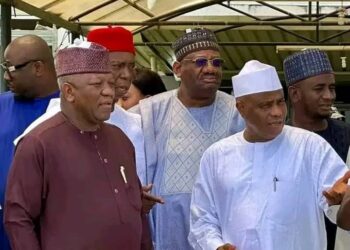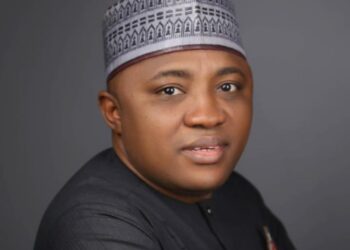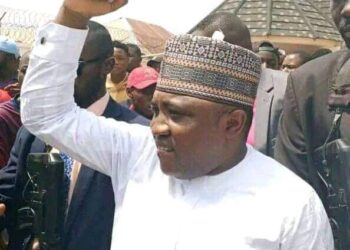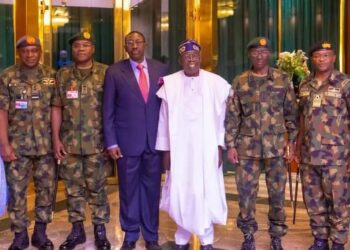There have been claims and counter claims on how Kogi state was created. In the book titled, ‘A NOBLE PATH’, an authorized biography of Jonathan Tunde Ogbeha, by Mr. Innocent Nzeke Waniko, revealed how Kogi state was created.
He declared “The movement for the creation of Kogi State commenced as far back as 1981, when many Elders of the old Kabba province such as Professor Albert Ozigi, Joseph Abu Ogbeha, Liman Umar, Walter Bako and Timothy Elukpo, amongst others, had mobilized themselves and set up a committee, headed by Senator Ahmadu Ali, to lobby various successive governments.
The group had submitted a memorandum to the National Assembly, in the second Republic, Shagari administration, for the creation of Kogi State separately from Kwara and Benue States. That effort died with the Shagari’s government that was eventually ousted from power a few years later. The agitation was resurrected when the Buhari military administration came into office. But it gained real and serious momentum when General Ibrahim Babangida assumed power.
On the 27th August 1991, General Ibrahim Babangida announced the creation of Kogi state alongside Edo and others. The creation of Kogi State was a significant development for its indigenes. It was a reunion of a many individuals on a new platform who had shared historical roots and co-existed peacefully within the former Kabba Province, in the defunct Northern Region that spanned over eighty years. The state which is structured into twenty-one Local Government Areas comprise three major ethnic groups i.e. Igala, Ebira and Okun (associated with Yoruba). Other groups include Bassa Komo, Bassa Nge, Kakanda, Nupe, Oworo and Ebira Koto.
The announcement made by General Ibrahim Babangida on 27th August, 1991 was straight forward. But as with the initiation of any state, the intrigues, intense lobby and negotiations that characterised the activities that went behind the scenes were not as effortless as the announcement seemed. Though, often quick to down play the commendable roles he played in the creation of Kogi State, Brigadier General Tunde Ogbeha’s effort from a cursory assessment went a long way in serving as the clincher that actualized the dream.
After creating Akwa-Ibom and Kastina States in 1987, the government had warned that it ‘would no longer entertain request for state creation from self-seeking politicians and champions of ethnic groups. Brigadier General TundeOgbeha, who was hoping for a miracle had approached Babangida and in a veiled conversation presented the agenda of the creation of Kogi State. General Babangida gave him the same response; “no more states creation”. Some elders from old Kabba-Province, who were led by Timothy Walter Bako, paid a solidarity visit to Brigadier General Tunde Ogbeha at Jajai in mid-1980’s as part of the ‘lobby’ to actualize Kogi State. The solidarity team got the same message from Brigadier General Tunde Ogbeha. He had encouraged his townsmen to make do with what was available in Kwara State and take advantage of the opportunities it presented. He also told them there was nothing to suggest their aspirations were going to be actualized as at that time.
But in politics, they say even 24 hours is a very long time. For Brigadier General Tunde Ogbeha, who was on the corridors of power, he shortly was privy to information that General Babangida was having a change of heart. Brigadier General Tunde Ogbeha therefore decided to present the request of the elders who had visited him to General Ibrahim Babangida. Brigadier General Tunde Ogbeha revived his request in early 1990, while stationed at Jaji in Kaduna State. Again he went to Abuja to consult with the Head of State, General Ibrahim Babangida, having earlier scheduled a visit. This time, a more resolute Brigadier General Tunde Ogbeha modified his strategy by with his late wife, Jacinta, to serve as good measure.
There have been claims and counter claims on how Kogi state was created. In the book titled, ‘A NOBLE PATH’, an authorized biography of Jonathan Tunde Ogbeha, by Mr. Innocent Nzeke Waniko, revealed how Kogi state was created.
He declared “The movement for the creation of Kogi State commenced as far back as 1981, when many Elders of the old Kabba province such as Professor Albert Ozigi, Joseph Abu Ogbeha, Liman Umar, Walter Bako and Timothy Elukpo, amongst others, had mobilized themselves and set up a committee, headed by Senator Ahmadu Ali, to lobby various successive governments.
The group had submitted a memorandum to the National Assembly, in the second Republic, Shagari administration, for the creation of Kogi State separately from Kwara and Benue States. That effort died with the Shagari’s government that was eventually ousted from power a few years later. The agitation was resurrected when the Buhari military administration came into office. But it gained real and serious momentum when General Ibrahim Babangida assumed power.
On the 27th August 1991, General Ibrahim Babangida announced the creation of Kogi state alongside Edo and others. The creation of Kogi State was a significant development for its indigenes. It was a reunion of a many individuals on a new platform who had shared historical roots and co-existed peacefully within the former Kabba Province, in the defunct Northern Region that spanned over eighty years. The state which is structured into twenty-one Local Government Areas comprise three major ethnic groups i.e. Igala, Ebira and Okun (associated with Yoruba). Other groups include Bassa Komo, Bassa Nge, Kakanda, Nupe, Oworo and Ebira Koto.
Advertisement
The announcement made by General Ibrahim Babangida on 27th August, 1991 was straight forward. But as with the initiation of any state, the intrigues, intense lobby and negotiations that characterised the activities that went behind the scenes were not as effortless as the announcement seemed. Though, often quick to down play the commendable roles he played in the creation of Kogi State, Brigadier General Tunde Ogbeha’s effort from a cursory assessment went a long way in serving as the clincher that actualized the dream.
After creating Akwa-Ibom and Kastina States in 1987, the government had warned that it ‘would no longer entertain request for state creation from self-seeking politicians and champions of ethnic groups. Brigadier General TundeOgbeha, who was hoping for a miracle had approached Babangida and in a veiled conversation presented the agenda of the creation of Kogi State. General Babangida gave him the same response; “no more states creation”. Some elders from old Kabba-Province, who were led by Timothy Walter Bako, paid a solidarity visit to Brigadier General Tunde Ogbeha at Jajai in mid-1980’s as part of the ‘lobby’ to actualize Kogi State. The solidarity team got the same message from Brigadier General Tunde Ogbeha. He had encouraged his townsmen to make do with what was available in Kwara State and take advantage of the opportunities it presented. He also told them there was nothing to suggest their aspirations were going to be actualized as at that time.
But in politics, they say even 24 hours is a very long time. For Brigadier General Tunde Ogbeha, who was on the corridors of power, he shortly was privy to information that General Babangida was having a change of heart. Brigadier General Tunde Ogbeha therefore decided to present the request of the elders who had visited him to General Ibrahim Babangida. Brigadier General Tunde Ogbeha revived his request in early 1990, while stationed at Jaji in Kaduna State. Again he went to Abuja to consult with the Head of State, General Ibrahim Babangida, having earlier scheduled a visit. This time, a more resolute Brigadier General Tunde Ogbeha modified his strategy by with his late wife, Jacinta, to serve as good measure.
Advertisement
Babangida had received the Ogbehas warmly. With pleasantries and initial welcome banters over, Brigadier General TundeOgbeha went into his real but carefully concealed reason for the visit to the Head of State. It started as a subtle suggestion, but turned into a direct request. In clear terms, Brigadier General Tunde Ogbeha requested that the administration of Babangida should considerof Kogi State and Lokoja as its state capital. Some of its indigenes had earlier wanted Ajaokuta, to be the capital of the proposed Kogi State, but those in favour of Lokoja argued that it had been the headquarters of Kabba Province and should be maintained as such.
General Babangida, after listening to Brigadier General TundeOgbeha made lot of enquiries from Ogbeha, on the feasibility, cultural setting and landscape of what was then proposed as Kogi State. Satisfied with the responses from his protege, Babangida had promised to create Kogi State. A happy Brigadier General TundeOgbeha had driven back to Jaji with his wife, and arrived at about 2.am. Not done however, Ogbeha also subsequently solicited the support of the late Mrs. Maryam Babangida for good measure. Just a few days after the visit to General Babangida, Ogbeha travelled out of Nigeria for a few weeks on vacation, as has been his practice over the years. In the months that followed the critical decision making, Babangida himself came under intense pressure from various interest groups and top military officers on similar requests.
With Brigadier General Tunde Ogbeha out of Nigeria and no physical presence to sustain his own request for the creation of Kogi State, the initial promise made to him by General Babangida appeared threatened. He (from his base abroad) reached out to his friend and brother, General David Mark and General Abdulsalam Abubakar to keep the pressure on General Babangida and sustain the lobby. Both men were members of the Armed Forces Ruling Council. At personal sacrifices amongst which were huge telephone bills and other discomforts, he continued the lobby to key members of the Babangida administration to keep the consideration of the creation of Kogi State afloat.
He made particular strategy of calling David Mark and Abdusalam Abubakar when the Armed Forces Council meetings were about to begin to remind them and when it ended to monitor its outcome. True to his word, Babangida created Kogi State. In spite of his sacrifices, Brigadier General Tunde Ogbeha summarised his efforts as thus: “I only acted as ago-between.”
However, many of the elders and indigenes of Kogi State, who were privy to his underground effort hold him in high esteem in helping to actualize the dream and aspirations of hundreds of thousands, if not millions of individuals who belong to different ethnicities. In spite of his own efforts, Brigadier General Tunde Ogbeha is mostly seen giving gratitude to General Ibrahim Babangida who made the ultimate decision of creating Kogi State. According to him, “there were many requests at the time, maybe more request for states creation than could be reasonably accommodated, but Babangida obliged us amidst many others.” Similarly, he is appreciative of the efforts of General Abdulsalami Abubakar and Senator David Mark who helped push the agenda even while he was absent at the critical moment of decision. In a chat with a journalist in 2016, he paid glowing tributes to General Abdulsalam Abubakar and Senator David Mark in particular for their huge efforts in the actualization of Kogi State. In his words: “it was a shared effort. They stood by us and I could not have done it without them.”
At the creation of Kogi State in August 1991, Colonel Danladi Mohammed Zakari, was appointed first military governor. On Zakari’s resumption, the new Governor was accommodated in Brigadier General Tunde Ogbeha’shouse, which also temporarily served as the Governor’s office. Brigadier General Tunde Ogbeha’s mother (Mrs. Priscillia Rakiya Ogbeha) made catering arrangements at her own expense. This arrangement lasted for over three months”.
©The Cable















